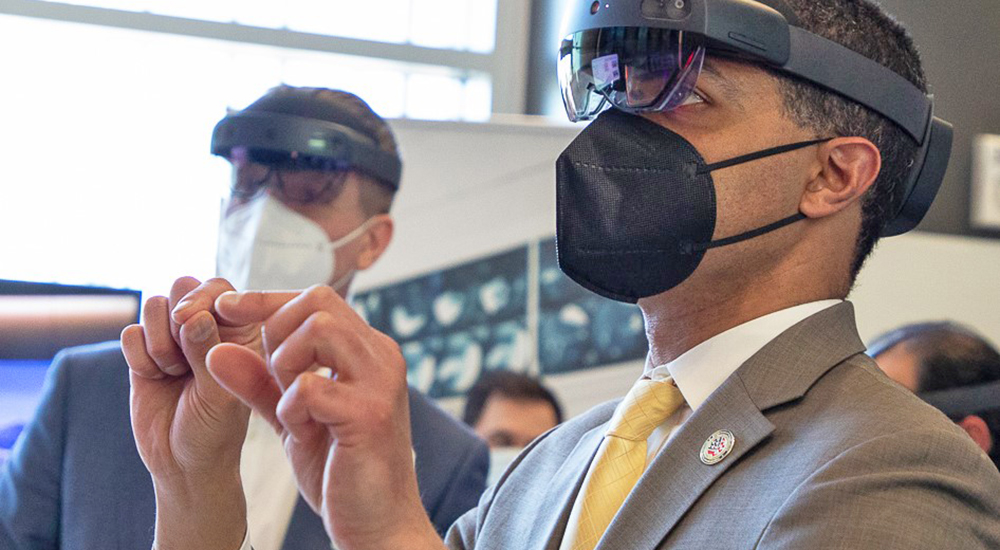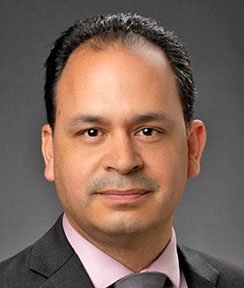Here’s how advanced technology innovations are tackling clinical problems.
David Arreola, deputy director of operations for the National Center for Collaborative Healthcare Innovation (NCCHI), is using advanced technology to optimize health care processes. His processes have not only improved quality, reliability and access to care for Veterans but set a national precedent of what health care of the future looks like.
“Our goal from the beginning was to try to create the health care system of the future. My work with NCCHI and our director, Dr. Thomas Osborne, has really painted a much clearer picture of the potential of new technology and how it would affect the health care system,” Arreola said.
Arreola was IT supervisor for Palo Alto VA, a team Osborne regularly consulted on IT innovation projects. His background in IT gave him an understanding of the barriers involved in incorporating technology and health care. The more he saw and talked about Osborne’s work, the more he became excited about the potential to positively impact the lives of Veterans and the future of health care.
Getting started in innovation
The innovation work Arreola did at NCCHI was very different than what he was doing in IT. He found innovation appealing because he developed new technology while his IT role worked mostly to maintain existing technology.
“It is very gratifying when projects come to fruition because there are more than enough reasons and barriers to stop a project. Any success we’ve had comes from being able to have the grit, determination and continuity within a group to push through each challenge until you have reached a significant milestone.”
Game changing innovation projects
Arreola has played a pivotal role in many projects coming out of NCCHI in support of Veterans. When the COVID pandemic sent workers home, large parts of VA care changed overnight. Clinics shut down and workers were displaced. Employees had valuable skills, but they weren’t working in active clinics anymore.
There was a desperate need to organize workers and a system that placed workers in areas of the hospital where they were needed most. This system also needed to be sensitive to the different specialties of each worker and place them accordingly.
Arreola and his team saw this problem and developed a solution: Issio Workforce Optimization and Float Pool. Issio is an advanced scheduling platform that identifies employees and allows them to be floated to other facilities or divisions. This innovation is unique because it considers the medical staff’s certifications and their various skill sets when floating or shifting them from one clinic or facility to another.
He worked with IT to fast track this program, achieved an authority to operate within three months and had an authorized app through the VA Office of Information and Technology. Since its development, Issio has been used for acute care and nursing. It has expanded to include more hospital wards, including anesthesia, medicine, and ER with intentions to spread to more sites soon.
Pictured above, VA Under Secretary for Health Dr. Shereef Elnahal tested augmented reality technology, the Verizon Medivis system, during his visit to the center at Palo Alto VA. The Verizon Medivis system is part of Arreola and NCCHI’s Project Convergence bringing augmented reality to clinical training, procedural guidance and presurgical planning.
Health care of the future
Arreola’s work at NCCHI has laid the foundation for even more advancements to follow, such as deploying the first full spectrum 5G hospital, a 5G-enabled drone program, holographic surgical planning and more.
“So now that we’ve done what we’ve done, I think the future looks very bright for health care overall. It’s extremely exciting to see the potential not just what currently exists but what potentially will exist within the next five years,” Arreola said.
Want to learn more about the innovation projects at NCCHI? You can explore our webpage to learn more about our work.
Want to learn more about innovation at VA? Visit our website, subscribe to our weekly newsletter, and visit VA Pathfinder to learn more about our opportunities.
Innovation Heroes is a recurring series from the VHA Innovation Ecosystem focusing on VA employees who are driving innovation forward and improving the lives of Veterans and fellow VA employees.
Topics in this story
Link Disclaimer
This page includes links to other websites outside our control and jurisdiction. VA is not responsible for the privacy practices or the content of non-VA Web sites. We encourage you to review the privacy policy or terms and conditions of those sites to fully understand what information is collected and how it is used.
More Stories
Study underscores important role COVID vaccination can have in protecting Veterans from infection and reducing long-term health consequences
Columbia VA’s robotic surgery teams completed their 800th robotic surgery and are on schedule to hit 1,000 by the end of the year.
In a decentralized clinical trial, Veterans can participate from their own homes or local VA instead of having to travel to a research site.








From the patient side, getting help innovating something outside the ‘box’ is virtually impossible. Even something simple, like a hearing aid that would help me, where none of the available ones don’t is like pulling hens teeth.
Since I’m not certified in anything related to audiology, my idea isn’t considered valid.
The VA is broken beyond repair